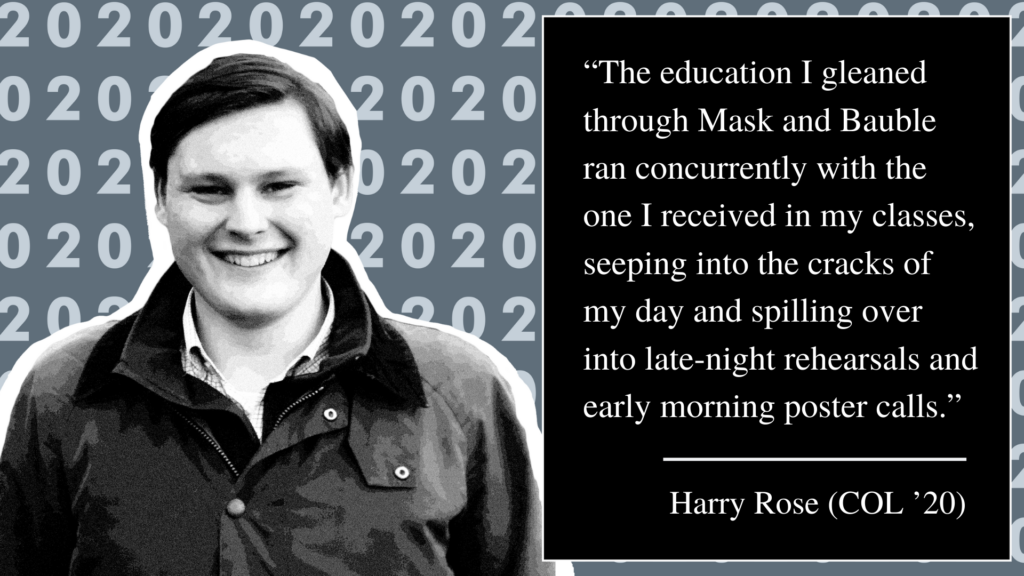When Hugo von Hofmannsthal adapted Sophocles’ “Electra” in 1903, the focus shifted from an Aristotelian representation of Greek mythology to teasing out the complex emotions and psychologies of the characters: a group of distant and damaged members of the house of Atreus on the eve of Orestes’ return. At one point, the beleaguered Chrysothemis, exhausted by the emotional havoc her vengeful older sister Elektra has wreaked in their home, says, “I cannot sit and stare into the dark as you do.”
I always detected irony in this line when I worked on the show as a sophomore with the Mask and Bauble Dramatic Society. For myself and many other gleefully beleaguered college students, “sitting and staring into the dark” — the necessary conditions for creating theater — was where I felt most at home.
Mask and Bauble was mentioned to me offhandedly by my graduate interviewer in a crowded Starbucks in suburban New York on a January day during my senior year of high school. Having done theater before, I diligently wrote the name of the oldest continuously running student theater group in the country into the Notes app on my phone and sought out the club when I arrived on campus that August. Maybe I would make some friends and try acting or work behind the scenes with the same group that put on the very polished “Into the Woods” I saw during my Georgetown Admissions Ambassador Program weekend. What I found was a community of smart, funny, diligent and empathetic friends: a diverse group united by a common interest and the willingness to explore with others, unfettered by the bureaucratic restrictions and creative limitations of a credit-bearing program.
The education I gleaned through Mask and Bauble ran concurrently with the one I received in my classes, seeping into the cracks of my day and spilling over into late-night rehearsals and early morning poster calls. It included the bootstrappy tasks of autonomous theater like hanging and cabling a light, setting up risers and operating a screw gun. But equally valuable was what I learned about existing in and supporting a community of people in social, technical and budgetary circumstances both so difficult and so ideal they seemed too good to be true.
A friend once said, “We don’t do theater for the audience. We do theater for ourselves.” It was a weird cognitive leap to make, especially when, as an audience member, I am used to going to the theater expecting to be entertained. But I soon realized what she meant: a college theater group is one of the safest environments there is. Never did I feel more empowered to stumble, to experiment, to grow and to think and talk big than I did at my beloved Poulton Hall, Stage III home. And the robustness of Georgetown University’s broader theater community meant I frequently had the chance to watch my closest friends and peers do the same thing.
For almost four years, I reveled in the feeling of total creative safety. I delighted in delusions that a show I had just poured so many hours and so much thought into was one of the greatest things I had ever seen and one of the most significant artistic statements ever made. And, what’s more, we always did it as a team. Every success was a shared one and there was no such thing as failure.
Theater is defined by its collectivism and its temporality. We gather in a space to create, gestate, collaborate and observe. We give birth to the moment, and we willingly let it pass away. This process of letting go is the routine ritual for those of us who work in the arts, but it is all too easy to take for granted when it is time to move on. Collective presence is what makes what we do special — the abrupt absence and fragmentation created by graduation make that all the more obvious. I could not have predicted over GAAP weekend the lessons Mask and Bauble would teach me — about collaborating, embracing the ephemeral and creating solidarity through a shared experience. I cannot express how much I will miss learning those lessons.
Whether through work in theater or another vocation, I hope any student will notice and pursue those opportunities for collaboration, production, formation and foundation — the metaphorical sitting and staring into the dark — that characterize the undergraduate experience outside the classroom. You will feel safer, stronger and more invigorated when it is time to turn the lights back on.
Harry Rose is a senior in the College and the Executive Producer of Mask and Bauble Dramatic Society.














